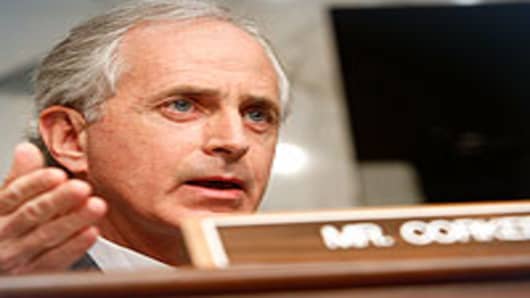Details on other areas of advanced agreement also became apparent Friday.
The Volcker rule -- a prohibition keeping federally supported banks out of speculative activities -- will be handled by regualators, not legislated by Congress, sources indicated.
Also, a systemic regulator will be built around a council format, with the Treasury Department serving as chair and the Federal Reserve as vice-chair.
Spokeswomen for Dodd and Corker would not comment on the current status or progress of talks only to say that they would continue through the weekend and that they remained optimistic a bill could be achieved.
Negotiations on regulaton of over-the-counter derivatives have yet to yield to anything firm. The subject may not wind up in the draft legislation underway and would instead be handled as an amendment.
The bulk of the negotiations involve Sens. Dodd and Corker, with Sen. Richard Shelby of Alabama, the ranking GOP memeber of the banking committee, more a peripheral figure.
Earlier this week, Shelby was said to have joined the Dodd-Corker talks, but that appears to be more a figurative than literal description.
Shelby and his staff have been working on their own version of a bill, which has been described as a serious alternative to the Dodd-Corker one and is also bipartisan in content, sources indicated.
Washington analysts say time is running out, with the White House clearly anxious for progress on the bill.
The president has stepped up his own efforts to push the regulatory reform agenda, weaving it into many speeches, in what is seen as a way of both supporting and keeping pressure on Senate negotiators.
Treasury Secretary Timothy Geithner Thursday met with the leaders of top financial trade groups—including the US Chamber of Commerce, Financial Services Roundtable, Financial Services Forum, Securities Industry and Financial Markets Association and the Independent Community Bankers Association—in an effort to build broad support for a bill.
There are also logistical concerns. Any compromise draft bill will be part of a long process, starting with debate at the committee level. And even if the Senate approves a package of reforms, it is likely to require reconciliation with the House version, followed by more votes.




